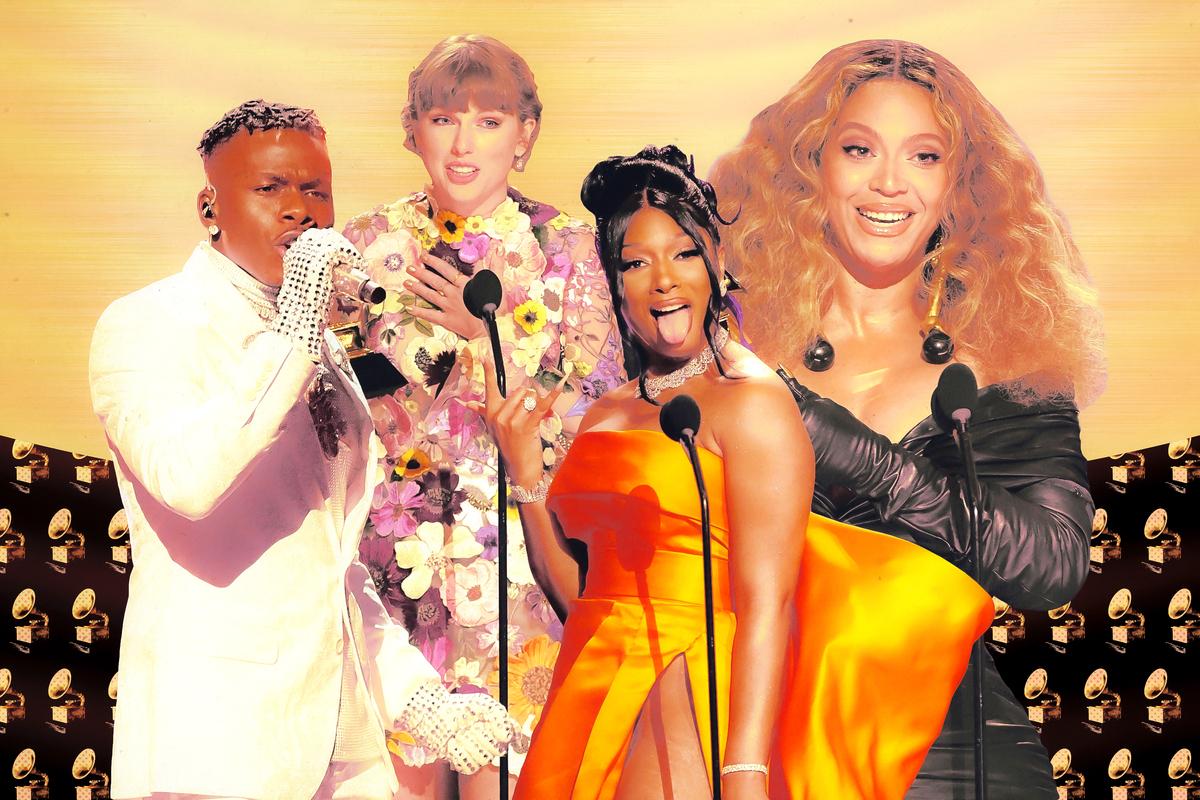
Wow! That was pretty good, until it suddenly wasn’t! Rad! Yikes! Oh, cool! Oh, no! Oh, well! In a stunning upset, in a destabilizing paradigm shift, in a colossal shock wave that will reverberate through the music industry for years to come, the 2021 Grammys were, for an astonishing percentage of their nearly four-hour running time, unironically quite pleasant, in all their distanced, awkward, overlong, over-choir’d, and award-wise occasionally quite wayward glory. That they then botched the landing horribly—with the third cringeworthy instance in recent memory of a white artist (Billie Eilish this time) all but apologizing to a Black artist (Megan Thee Stallion this time) for winning a major award (Record of the Year this time) the Black artist definitely should’ve won—functioned almost as a branding exercise, as a last-second reminder that this was, in fact, still the Grammys. For much of the preceding three and a half hours and change, it was blissfully easy to forget; it was easy, for once, to just mildly enjoy.
So first let’s remember the good times. As a collection of awards, on paper, the 2021 Grammys shrewdly spread the love around, further hailing various megastars (Taylor Swift’s Folklore for Album of the Year, the boring choice but also the right one) while also shrewdly cosigning a few new ones (Megan Thee Stallion for Best New Artist, the right choice but certainly not a boring one). Dua Lipa’s Future Nostalgia for Best Pop Vocal Album: yes. Miranda Lambert’s Wildcard for Best Country Album: yes. Bad Bunny’s YHLQMDLG for Best Latin Pop or Urban Album, awarded earlier Sunday afternoon but briefly replayed in prime time so we could dig his bunny ears: weird category name, but yes. (The Dumbest Category Name Grammy goes to Best Melodic Rap Performance, won by Anderson .Paak, who I’m sure was both thrilled and amused.)
Also (slightly) thrilled: Beyoncé, who actually showed up (with her husband!), collected four more Grammys—including two, Best Rap Song and Best Rap Performance, for her part in Megan Thee Stallion’s “Savage” remix—and thereby became the single most Grammy-decorated female artist (28 wins total) in history. There were mild Grammys-Gonna-Grammy upsets: The throwback-R&B-minded polymath H.E.R., a genuinely striking talent almost underserved by the Recording Academy’s wanton overpraise, took Song of the Year for “I Can’t Breathe,” bypassing far better and more prominent options like Beyoncé’s “Black Parade” (which settled for Best R&B Performance) or Dua Lipa’s “Don’t Start Now.” But as a guy who recently helped write a 6,500-word treatise on the last 20 years of Grammy Album of the Year disasters, I’m here to tell you that this hallowed institution screws up way worse the vast majority of the time.
These awards were doled out on an outdoor stage, to a distanced and extravagantly masked crowd of only the stars themselves; I have watched Taylor Swift deliver dozens of earnest acceptance speeches in my lifetime, but this was the first one that required her to shout over a droning jet engine. Very relatable. I’m into it. But the actual statues, for much of the night, hardly mattered: Sunday night’s broadcast averaged one televised award per hour for quite a while, preferring instead a pleasing bombardment of performances—some live, some prerecorded—that alone among recent award shows managed to turn pandemic-mandated restraints into features, not bugs. These ranged from spare immediacy (Haim bopping through “The Steps” and flaunting their superlative walking skills) to endearingly twee overindulgence (Taylor Swift kicking off her medley by crooning “Cardigan” on a moss-covered cabin roof) to sheer delightful loopiness. (DaBaby thundered through “Rockstar” with a white suit and a backing choir arrayed in judge’s robes, an electrifying midair collision of pomp and camp.)
The classic Grammys move is to force every performer into that overwrought Choir + Orchestra mode, the better to convey the Recording Academy’s fundamental stuffiness, which is how you get, say, Roddy Ricch playing a grand piano. (Post Malone, in maximum goth-metalhead mode for “Hollywood’s Bleeding,” at least innovated by dressing his backing choir like sci-fi druids.) But when that forced-elegance approach works, it works: Country singer (and country star, if the Nashville machine doesn’t blow it) Mickey Guyton blazed through her searing ballad “Black Like Me” with a ferocity that overpowered any attempts at overwatering. The other usual tiresome move on Music’s Biggest Night is the manufactured Grammy Moment, where a vibrant young star is paired haphazardly with a sleepy old vet, but other than reliable doofus John Mayer hitting some excellent guitar notes during country star Maren Morris’s “The Bones,” the Academy mostly gave that a rest tonight. I didn’t see Sting anywhere.
Instead, we got overwhelming hugeness, but on a singular artist’s own singular terms. K-pop deities BTS delivered a triumphant “Dynamite” that climaxed on what sure as hell looked like a rooftop helipad. Cardi B and Megan Thee Stallion gyrated vibrantly through a network-TV-friendly but still plenty-lewd “WAP.” (That one climaxed on a giant bed; Trevor Noah, a genial and inoffensive host for the rest of the night, bounded right onto that bed afterward and basically drooled all over it.) Lil Baby’s performance of “The Bigger Picture” started with the staged police shooting of a Black man, then added activist Tamika Mallory, Run the Jewels luminary Killer Mike, and a molotov cocktail or two. Even a scheme more in the Grammys’ comfort zone like Silk Sonic, the new flagrant throwback-soul team-up of Bruno Mars and Anderson .Paak, got over on sheer luscious bombast, the velvety suits and the gaudy period lighting calibrated just so.
The lengthy In Memoriam section was especially effective this year, in part simply because the roster of artists we’ve lost recently—from John Prine to Sophie, Bill Withers to MF DOOM, Eddie Van Halen to Charley Pride—is incomprehensibly brutal. The performances here had a tremendous gravity and even grace: Brandi Carlile using Prine’s “I Remember Everything” to give the master songwriter the sendoff the CMA Awards wouldn’t, Lionel Richie bringing an ever-so-slightly swaggering dignity to Kenny Rogers’s “Lady,” Silk Sonic blasting through a suitably inelegant Little Richard medley, and Brittany Howard (with Coldplay’s Chris Martin on piano but out of the spotlight) thundering through Gerry and the Pacemakers’ “You’ll Never Walk Alone.” The lack of a crowd, the making-the-best-of-it shakiness of some of the live staging, the nearly Zoom-free nods to our still-ongoing COVID reality (including several mini-profiles of iconic small music venues, from the Apollo to the Troubadour, that are desperate to reopen) … all this somehow worked in the Grammys’ favor, in sharp contrast to the utter catastrophe of the Golden Globes. This was the best pandemic-era award show by orders of magnitude, humbled but not quite hobbled.
And then, with mere seconds left on the clock, they blew it. Not entirely, but, like, they blew a lot of it. Record of the Year—which awards the performance of a song, whereas Song of the Year rewards the songwriters—went to Billie Eilish, last year’s major-category-sweeping new superstar, for her blatantly slight stopgap single “Everything I Wanted.” Eilish fully deserved her coronation last year, but this time she looked shocked, which may explain why she started her acceptance speech with “This is really embarrassing for me” and then proceeded to praise Megan Thee Stallion, nominated for “Savage,” at uncomfortable length. “I was going to write a speech about how you deserve this, but then I was like, there’s no way they’re going to choose me,” Eilish said to Megan directly. “I was like, ‘It’s hers.’ You deserve this.”
This keeps happening: Adele apologizing to Beyoncé while accepting Album of the Year in 2017, Macklemore cringe-texting Kendrick Lamar after winning Best Rap Album in 2014. “Savage” was not considered an absolute lock to win Record of the Year, but it would’ve been a far better choice; same deal with “Black Parade,” which would’ve given Beyoncé only her second career major-category win. It was a hellaciously sour note on which to end an otherwise remarkably sweet night for the Grammys, which embraced restraint when it had to but still flew off the rails whenever it wanted to. The Recording Academy’s distinct brand of discomfiting chaos reasserted itself in the end, but those preceding three hours and change were a surprising balm indeed. They’ll try again next year, but for the first time in forever, I might actually be looking forward to it.

